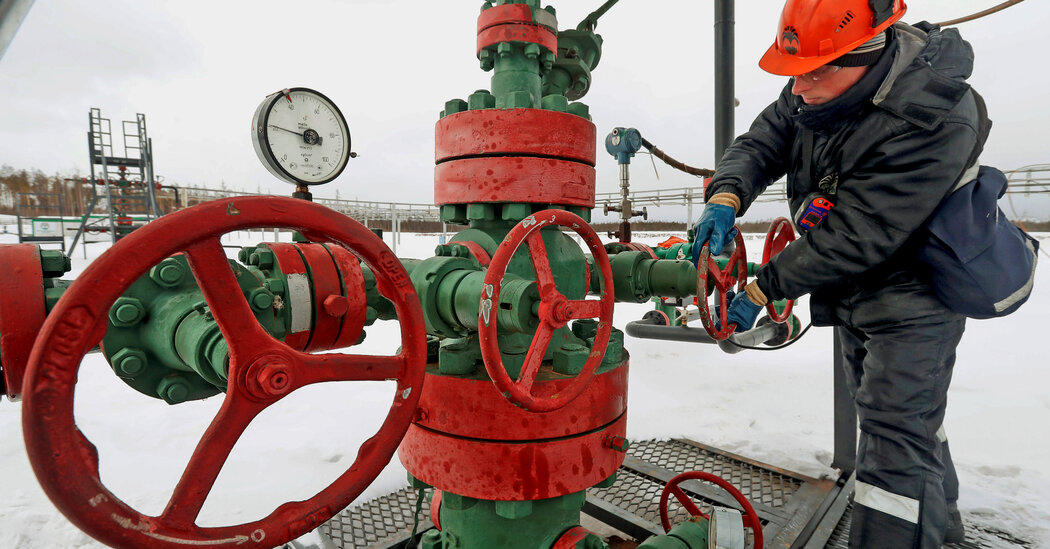
Russia’s war in Ukraine is not only reshaping the strategic and political order in Europe, it is also upending long-held assumptions about the intricate connections that are a signature of the global economy.
Millions of times a day, far-flung exchanges of money and goods crisscross land borders and oceans, creating enormous wealth, however unequally distributed. But those connections have also exposed economies to financial upheaval and crippling shortages when the flows are interrupted.
The snarled supply lines and shortfalls caused by the pandemic created a wide awareness of these vulnerabilities. Now, the invasion has delivered a bracing new spur to governments in Europe and elsewhere to reassess how to balance the desire for efficiency and growth with the need for self-sufficiency and national security.
And it is calling into question a tenet of liberal capitalism — that shared economic interests help prevent military conflicts.
It is an idea that stretches back over the centuries and has been endorsed by romantic idealists and steely realists. The philosophers John Stuart Mill and Immanuel Kant wrote about it in treatises. The British politicians Richard Cobden and John Bright invoked it in the 19th century to repeal the protectionist Corn Laws, the tariffs and restrictions imposed on imported grains that shielded landowners from competition and stifled free trade.
Later, Norman Angell was awarded the Nobel Peace Prize for writing that world leaders were under “A Great Illusion” that armed conflict and conquest would bring greater wealth. During the Cold War, it was an element of the rationale for détente with the Soviet Union — to, as Henry Kissinger said, “create links that will provide incentive for moderation.”
Since the disintegration of the Soviet Union three decades ago, the idea that economic ties can help prevent conflict has partly guided the policies toward Russia by Germany, Italy and several other European nations.
Today, Russia is the world’s largest exporter of oil and wheat. The European Union was its biggest trading partner, receiving 40 percent of its natural gas, 25 percent of its oil and a hefty portion of its coal from Russia. Russia also supplies other countries with raw materials like palladium, titanium, neon and aluminum that are used in everything from semiconductors to car manufacturing.
Just last summer, Russian, British, French and German gas companies completed a decade-long, $11 billion project to build a direct pipeline, Nord Stream 2, that was awaiting approval from a German regulator. But Germany halted certification of the pipeline after Russia recognized two separatist regions in Ukraine.
From the start, part of Germany’s argument for the pipeline — the second to connect Russia and Germany — was that it would more closely align Russia’s interests with Europe’s. Germany also built its climate policy around Russian oil and gas, assuming it would provide energy as Germany developed more renewable sources and closed its nuclear power plants.
Benefits ran both ways. Globalization rescued Russia from a financial meltdown and staggering inflation in 1998 — and ultimately smoothed the way for the rise to power of Vladimir V. Putin, Russia’s president. Money earned from energy exports accounted for a quarter of Russia’s gross domestic product last year.
Critics of Nord Stream 2, particularly in the United States and Eastern Europe, warned that increasing reliance on Russian energy would give it too much leverage, a point that President Ronald Reagan made 40 years earlier to block a previous pipeline. Europeans were still under an illusion, the argument went, only this time it was that economic ties would prevent baldfaced aggression.
Still, more recently, those economic ties contributed to skepticism that Russia would launch an all-out attack on Ukraine in defiance of its major trading partners.
In the weeks leading up to the invasion, many European leaders demurred from joining what they viewed as the United States’ overhyped warnings. One by one, French President Emmanuel Macron, German Chancellor Olaf Scholz and Italian Prime Minister Mario Draghi talked or met with Mr. Putin, hopeful that a diplomatic settlement would prevail.
There are good reasons for the European Union to believe that economic ties would bind potential combatants more closely together, said Richard Haass, president of the Council on Foreign Relations. The proof was the European Union itself. The organization’s roots go back to the creation after World War II of the European Coal and Steel Community, a pact among six nations meant to avert conflict by pooling control of these two essential commodities.
“The idea was that if you knit together the French and German economies, they wouldn’t be able to go to war,” Mr. Haass said. The aim was to prevent World War III.
Scholars have attempted to prove that the theory worked in the real world — studying tens of thousands of trade relations and military conflicts over several decades — and have come to different conclusions.
The Russia-Ukraine War and the Global Economy
In terms of the current crisis, Mr. Haass argued, in some ways the economic benefits were not mutual enough. “The Germans needed Russian gas much more than Russia needs exports, because they can make up for lost revenue with higher prices,” he said.
“That’s where Europe handled the relationship all wrong,” Mr. Haass added. “The leverage wasn’t reciprocal.”
Despite its huge land mass, nuclear arsenal and energy exports, Russia is otherwise relatively insulated from the global economy, accounting for 1.7 percent of global output. And since Russia’s invasion of Crimea in 2014, Mr. Putin has moved to isolate the economy even more to protect against retaliation.
Adam Posen, president of the Peterson Institute for International Economics, said that the willingness to impose such devastating sanctions against Russia may point to the flaw in that strategy. If Russia’s financial system was more integrated with those of the allies, they might have been more hesitant to take measures that could provoke a financial crisis.
At the moment, economic relations with Russia are running on parallel tracks. Countries opposed to Russia’s invasion of Ukraine have imposed a series of damaging financial and trade sanctions, yet Russian oil and gas — exempted from the bans — are still flowing.
The reality is economic interdependence can breed insecurity as well as mutual benefits, particularly when the relationship is lopsided.
Philippe Martin, the dean of the School of Public Affairs at SciencesPo in Paris, said that the 2014 agreement between Ukraine and the European Union may have marked a turning point for Russia. “That translated into more trade with the E.U. and less with Russa,” he said.
Mr. Martin has written skeptically that economic ties promote peace, arguing that countries open to global trade can be less worried about picking a fight with a single nation because they have diverse trading partners.
In the case of Russia’s march toward Kyiv, though, he offered two possible explanations. One is that no one — including the European leaders who imposed them — expected such crippling sanctions.
“I think that Putin miscalculated and was surprised by the harshness of the sanctions,” Mr. Martin said. “The second interpretation is that Putin does not care” about the impact that sanctions are having on the welfare of most Russians.
Which does he think is correct? “I think both interpretations are valid,” he said.




